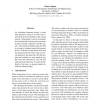Free Online Productivity Tools
i2Speak
i2Symbol
i2OCR
iTex2Img
iWeb2Print
iWeb2Shot
i2Type
iPdf2Split
iPdf2Merge
i2Bopomofo
i2Arabic
i2Style
i2Image
i2PDF
iLatex2Rtf
Sci2ools
NAACL
2007
2007
Near-Synonym Choice in an Intelligent Thesaurus
An intelligent thesaurus assists a writer with alternative choices of words and orders them by their suitability in the writing context. In this paper we focus on methods for automatically choosing near-synonyms by their semantic coherence with the context. Our statistical method uses the Web as a corpus to compute mutual information scores. Evaluation experiments show that this method performs better than a previous method on the same task. We also propose and evaluate two more methods, one that uses anti-collocations, and one that uses supervised learning. To asses the difficulty of the task, we present results obtained by human judges.
Computational Linguistics | Intelligent Thesaurus | NAACL 2007 | Semantic Coherence | Statistical Method |
| Added | 30 Oct 2010 |
| Updated | 30 Oct 2010 |
| Type | Conference |
| Year | 2007 |
| Where | NAACL |
| Authors | Diana Zaiu Inkpen |
Comments (0)

